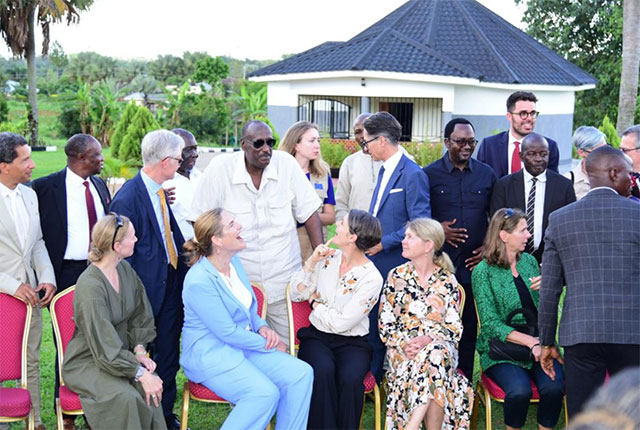Dangers of western paternalism

CAPTION: EU ambassadors in Uganda enjoyed a vibrant discussion with Gen. Salim Saleh (middle) who they visited in Gulu recently, and raised several issues on Uganda’s governance.(Courtesy photo).
By Andrew Mwenda
GULU – On Wednesday, May 21, I attended a meeting of Gen Salim Saleh with EU ambassadors in Gulu. What was reported in the press and social media video clips, were fragments that stripped my argument of its context. First, Europeans have no moral right to interfere in internal political affairs. Secondly, it is against international law to do so. These interventions are driven by an exaggerated sense of racial superiority often dressed in cultural garb as “values.” But even then, if these values are good for us, why do Europeans believe that we Africans cannot struggle for them ourselves?
Any reasonable person would become suspicious. You cannot beat your wife daily and then take to the pulpit to preach against domestic violence. It is called hypocrisy. Some accuse me of “whataboutism.” I plead guilty. I see whataboutism as a powerful moral standpoint. In Matthew Chapter 1.7, Jesus cautions against trying to remove a speck from a friend’s eye when you have a log in your own. The English have a saying that charity begins at home. And the best form of leadership is by example. A crook does not have the moral right to be a champion against fraud.
Analytically, whataboutism shows that social situations are complex and individuals and governments are often compelled by circumstances to act in particular ways. EU embassies violate our rights every we apply for visas. They subject us to mean and humiliating treatment by invading our privacy (getting our bank records, titles to our properties etc.). Their official documents state clearly that they consider us criminals trying to enter their countries to become cleaners unless we prove ourselves otherwise. I get appalled by this but understand their home politics that have shaped this human degradation of Africans trying to travel to Europe.
Therefore, EU concerns in Uganda are not about human rights. They are about power. They are saying we are poor and weak and therefore do not have the competences or the right to govern ourselves. Instead we need the benevolent paternalistic hand of Europeans to manage our affairs. They don’t believe we can fight for our rights ourselves, like they did! Why? They do not see us as active participants in the struggle to realize these rights. They see us as passive spectators in it, mere beneficiaries of international charity provided by them. Like their colonial forefathers, Europeans see us as perpetual children who need their parenting.
This is colonialism 101. Colonialism justified itself with claims of seeking our emancipation, so its mission was to liberate us from the tyranny of our customs and the despotism of our chiefs and kings. Its flag was the three Cs: Christianity (to emancipate our souls from “devil worship”, yes, our religions were called satanic), Commerce to liberate us from our poverty, and Civilization (to liberate us from our institutional backwardness). Of course, behind these high-sounding moral slogans lay their real interests. Colonialism was characterised by genocide, forced labor, land grabbing, extortionate taxation, and violence—both physical and epistemic.
Today the three Cs have been renamed and repurposed for continued control of our affairs. Christianity has become democracy; commerce is now trade and investment (foreign direct investment that either displaces or stifles the growth of our local bourgeoisie); and civilization is the imposition of European bureaucratic rules on our societies. Their institutions, values, ideas, and ideals are not bad in and of themselves. It is their lack of context. If they work well in their countries, it is not because of their intrinsic goodness but because they evolved organically out of the European experience: structural changes instigating political struggles, and these struggles leading to the creation of particular institutions, themselves nourished by a nutrient culture, norms, and values.
Leaving us to manage our affairs is very important. We will make mistakes and learn from them. That is how societies grow. There are gross human rights abuses in Europe and North America, but our ambassadors in their capitals are not lecturing and hectoring their leaders over this. Japan and South Korea are democracies that give us money but don’t indulge in these arrogant lectures. China funds our government but does not insist we become Chinese in our governance. India does something similar. What is this in the European mind that gives them the feeling and entitlement to interfere in our internal affairs against international law?
We are facing a problem of a racial superiority complex. This is deeply embedded in the conscious, sometimes subconscious, and even unconscious European mind. It just comes naturally to them, often without them noticing it. Africans do not need help from Europe. We need collaboration. We should seek to liberate Europeans from their racial superiority complex. We can do this by being bluntly honest with them. Ugandans deserve the right not to be tortured. But that is our domestic issue. It’s a war for us Ugandans to fight and win. And progress will not be linear. There will be reversals along the way, but it should remain firmly in our hands.
When Europeans insert themselves in our struggles, they make local agency look like fifth columnists of foreign powers seeking regime change. This undermines the legitimacy of local activists. While I acknowledge the importance of international solidarity in our struggle, I reject the means Europeans use. Issuing lectures, summons and threats to our governments is neither prudent nor desirable; it is neither effective nor necessary. On the contrary, as I have stated above, it discredits local agency.


